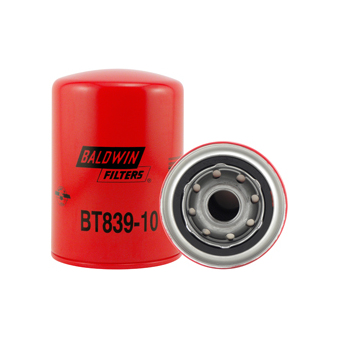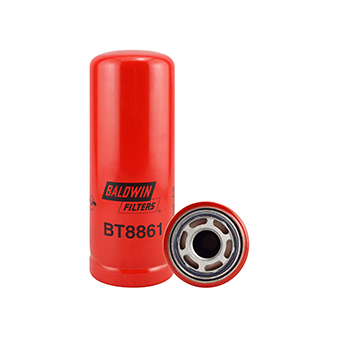Hydraulic Filters
Hydraulic Filters
The importance of system maintenance has grown in tandem with the sophistication of hydraulic systems and components. Proper filtration to ensure clean hydraulic oil is the simplest and most cost-effective technique to save maintenance costs and help ensure trouble-free hydraulic system operation...Hydraulic filters are critical components of hydraulic systems and were at a time nonexistent. As hydraulic systems have become far more common place replacing belts, chains, cables and other forms of power transmission the necassity to protect these systems with appropriate filtration has grown significantly. Hydraulic systems are likewise getting increasingly difficult to maintain. The majority of new hydraulic equipment is designed to be simpler to use and maintain. This frequently necessitates tighter tolerances, faster cycle times, greater pressures, longer service intervals, and more complicated systems, all of which place additional demands on the filter. With these demands on today's hydraulic systems, it is critical to maintain system cleanliness through effective hydraulic filtration to ensure optimal efficiency and reliability.
Adequate filtration begins with selecting the appropriate filter based on the recommendations of the original equipment manufacturer, which include:
• 1. The type of fluid utilised and the operating pressure of the system.
• 2. The amount of fluid flow required to keep the system running.
• 3. The amount of restriction (fluid flow resistance) caused by the filter.
• 4. The amount of contamination that the filter must be capable of trapping and retaining in order to meet service interval requirements.
• 5. The filtration level (fluid cleanliness level) required by the application.
Keeping this in mind, it is vitally necessary for the efficient long-term operation and protection of a hydraulic system to have an adequate hydraulic oil filter for the specific application fitted, as well as quality hydraulic oil that is constantly maintained. There are many various types of hydraulic filters, and when you decide to buy an aftermarket filter, you must make sure that it is manufactured to satisfy the necessary OEM standard for that application, not just suitable for purpose. FCP Solutions can aid you in making this decision by providing a wide choice of filters. We only supply filters that meet or exceed OEM specifications from recognised global manufacturers. In addition to these considerations, FCP Solutions recognises that hydraulic systems use more filters than ever before. When recommending an aftermarket filter, we evaluate factors such as:
• Micron Rating - Micron ratings express the particle size that the filter media can remove from the fluid. We make certain that our entire hydraulic filter line satisfies the micron rating of the filter we are replacing.
• Bypass Valve - A bypass valve is a safety feature used in some hydraulic filters and hydraulic filter heads that opens when oil pressure reaches a specific level, allowing unfiltered oil to flow as rapidly as possible. This is to avoid the system running out of oil and loosing pressure. Under ideal conditions, the bypass valve should remain closed, but if it is required to work, it is vital the settings are correct. When replacing aftermarket hydraulic filters, we verify that the replacement matches the OEM, so if a bypass valve is required, the replacement filter not only has one, but also matches the pressure of the bypass valve setting of the original.
• Anti Drain-back Valve - When the hydraulic system is turned off, the anti drain-back valve prevents oil from draining from the filter. We make certain that every filter we sell has an anti-drain-back valve if required by the OEM specification for that filter.
• Filtration Media - FCP Solutions' whole filter line contains only the highest grade material and meets OEM specifications. When the OEM uses synthetic material, many generic filters save money by employing lesser grade cellulose media. We only sell filters that meet or exceed the applicable OEM specification, which means that if the OEM uses synthetic media, our replacement will as well. Higher pressure, hydraulic, and transmission applications benefit from synthetic media. Manmade glass fibres offer properties that provide the least amount of flow resistance while eliminating impurities from fluid.
When To Change Hydraulic Oil Filters?
In a perfect world, hydraulic filters should be replaced when the dirt holding capacity of the filter reaches around 80 percent full, but before the filter has gone on bypass. As a general guide, hydraulic filters should be changed in the following applications:
• Trucks, Machinery and Industrial application - every 2,000 hours or as per the maintenance manual and if oil sampling based on the test data.
Some users change their hydraulic filters more frequently because of the environment the equipment is operating in and the hydraulic oil is frequently contaminated. Hydraulic filters can become clogged and the oil may be passing by the filter media through the bypass valve unfiltered. An hydraulic system exhibiting performance issues should have the oil and filter inspected as part of other checks when perfromance isn't as expected:
Because they play such an important part in avoiding your hydraulic system from failing in a catastrophic way, it is imperative that you perform regular maintenance and replace hydraulic oil filters. When it is time to replace your dirty or blocked hydraulic filter, FCP Solutions is able to provide the highest level of protection available on the market thanks to our extensive selection of filters and our knowledgeable assistance.









